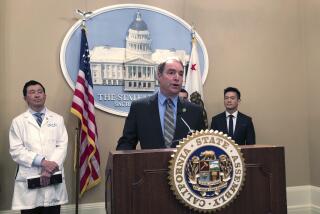Senate OKs Buyout for Tobacco Growers, Cigarette Regulation
- Share via
WASHINGTON — The Senate approved a measure Thursday that would combine a $12-billion buyout for tobacco growers with authority for the government for the first time to regulate the ingredients of all tobacco products, including nicotine levels.
The buyout would end a Depression-era quota and price support system for tobacco growers, which even tobacco farmers complain inflates their costs and makes it impossible to compete with foreign-grown tobacco.
Hundreds of tobacco growers would receive more than $1 million, according to the Environmental Working Group, a watchdog organization. Growers could continue to plant and harvest tobacco but without the quota system and price support system.
The Food and Drug Administration would gain broad powers to regulate the manufacture, distribution, sale and advertising of all tobacco products, including cigarettes, cigars, pipe and chewing tobacco. The bill would require that the health warnings on those products be more prominent, covering at least 30% of each cigarette pack. It would restrict tobacco marketing, particularly in youth-oriented magazines.
The two-part measure was adopted, 78 to 15, as an amendment to a wide-ranging corporate tax bill, which passed the Senate two months ago. The House has also attached a $9.6-billion tobacco buyout -- without additional FDA regulation -- to the corporate tax measure. Before the bill can go to the White House, a single compromise version will have to be reached..
Supporters of each part of the legislation in the Senate conceded that they could not have gained passage for their measure without the other.
“The unlikely coalition of tobacco growers and public health experts is what has given this effort momentum,” said Matthew L. Myers, president of the Campaign for Tobacco Free Kids, an advocacy group.
The FDA measure was sponsored by Sen. Mike DeWine (R-Ohio) but was supported largely by Democrats. The buyout for tobacco farmers found most of its support among senators from tobacco-growing states such as Kentucky, North Carolina and Virginia.
In the Senate legislation, the tobacco industry would pay for the buyout. Under the original House approach, taxpayers would pay for it.
But House legislators, responding to outrage over the plan to have taxpayers foot the bill, voted Tuesday to prevent the Agriculture Department from using its budget to implement the buyout.
President Bush has said that he is open to a tobacco buyout. White House spokesman Trent Duffy said the White House was ready to negotiate with Congress to produce legislation that is “fair to farmers and fair to taxpayers.” Sen. John F. Kerry of Massachusetts, the Democrats’ presumptive choice to run against Bush in November, did not vote Thursday but has said he supports the buyout.
The administration has not revealed its position on FDA regulation of tobacco, Duffy added, but is willing to consider the Senate legislation during negotiations in the coming weeks.
Supporters of that portion of the legislation said it would give the government an important new tool to fight smoking, especially among children.
“Smoking is a health epidemic for our young people,” said Sen. Edward M. Kennedy (D-Mass.), one of the chief sponsors of the FDA legislation. “This is the most important step we can take for public health short of curing cancer itself.”
The bill’s focus is to keep cigarettes out of the hands of children. More than 40 million Americans are addicted to cigarettes, and more than 90% of them started smoking as children, according to the bill’s Senate sponsors.
The bill gives the FDA the power to prevent advertising that appeals to children and to ban cigarettes that are flavored with chocolate, strawberry and other flavors meant to tempt children and give more teeth to the rules preventing tobacco sales to minors.
The bill would give the FDA power to require that tobacco products carry a list of their ingredients on their labels, just as packaged food must. The ingredients include trace amounts of arsenic, DeWine said.
The agency would also gain power to remove or reduce hazardous ingredients from cigarettes. The FDA could reduce nicotine, which makes cigarettes addictive, but the bill explicitly prevents the agency from completely removing nicotine or banning any tobacco products.
“It’s not a prohibition bill,” DeWine said. “Why? Because prohibition would not work.”
The FDA asserted jurisdiction over tobacco in 1996 and took steps to curtail advertising, but in 2000 the Supreme Court found that the FDA lacked authority to do so. The Senate-passed legislation would reinstate the regulations that were developed at that time to restrict children’s access to tobacco products and advertising aimed at children.
The legislation was the result of negotiations between the various Senate sponsors, the public health community and Philip Morris USA, the cigarette company with roughly 50% of the U.S. market.
Philip Morris has supported FDA regulation of tobacco since 2000, but other tobacco companies oppose it. Dr. Christopher Rizzo, a Cleveland pediatrician, said he hoped the legislation would lead to cigarette labels listing how much nicotine and other harmful chemicals are in cigarettes.
“It would give incentives for the manufacturers to make the cigarettes safer,” he said.
Dr. Roy Artal, a pulmonologist at Good Samaritan Hospital in Los Angeles, said reducing only the nicotine in cigarettes would not get at the truly unhealthy chemicals.
“It’s the other ingredients that hurt,” he said, and no amount of tinkering with the constituent chemicals would remove all the cancer risk from inhaling cigarette smoke.
Nor could Congress eliminate smoking by making it illegal. Artal said public bodies locally have had the most impact by outlawing smoking in public places.
The buyout approved by the Senate would end the federal price supports and quota system for the production of tobacco. Currently, tobacco farmers are guaranteed a specific price for every pound of tobacco they produce. After the buyout, farmers would have to compete on an open market with no support from the federal government.
In the 1930s, the government gave them quotas for the amount of tobacco they could sell. Since then, these quotas have been treated like assets in tobacco-growing states and are leased, sold, taxed and inherited.
Quotas for burley, one type of tobacco, now lease for about 60 cents a pound per year, the bill’s sponsors said, adding that much to the tobacco’s cost.
Sen. Mitch McConnell (R-Ky.), the chief sponsor of the buyout, said the government created the asset of the quotas.
“Now if the government is going to terminate the asset, it is appropriate that the government compensate” quota holders, he said.
Other tobacco-state senators said a buyout was necessary to help thousands of small farmers who have seen their livelihoods devastated over the last several years as their crops have become uncompetitive with cheaper crops from abroad.
More to Read
Get the L.A. Times Politics newsletter
Deeply reported insights into legislation, politics and policy from Sacramento, Washington and beyond. In your inbox twice per week.
You may occasionally receive promotional content from the Los Angeles Times.










